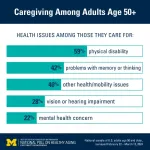(Press-News.org) More than 1 in 4 people age 50 and older helps take care of at least one family member or friend who has a health problem or disability, a new poll finds.
And among those caregivers, the new results from the University of Michigan National Poll on Healthy Aging reveal a lot about who they are and who they’re caring for.
In all, 30% of all people in their 50s and early 60s provide care to at least one person with a health issue or disability, compared with 23% of people over 65. And 1 in 10 caregivers in their 50s and early 60s are juggling taking care of three or more people.
In addition to differences by age, there was also a gender divide: 32% of women age 50 and over act as caregivers to someone with a health issue or a disability, compared with 22% of men in this age group.
The poll also reveals more about who caregivers age 50 and older are caring for.
In all, 23% of caregivers are caring for an adult or child with an intellectual or developmental disability, and 66% are caring for a person age 65 or older.
The most common health issue or disability that caregivers help their friends or family with was a physical disability or mobility problem, at 59%. The next most common was memory or thinking issues, at 42%, followed by vision or hearing impairments at 28%, and mental health concerns at 22%. Beyond these specific types of issues, 40% of caregivers said they care for someone with another condition. Caregivers could choose all conditions that apply to all the people they care for.
Views on caregiving cost responsibility
The poll asked all respondents who they think should take the lead when it comes to covering the cost of caregiving for people over age 65. In all, 45% of people 50 and older feel the government should take the lead, while 27% believe it should be the person receiving care, 18% think it should be family or friends, and 10% said it should be other sources.
However, caregivers were more likely to think the government should take the lead in covering the cost of caregiving for older adults (51%) than those who do not provide regular care to a person with a health issue or disability (42%).
The same was true for those in the lower end of the poll’s age range: 48% of people in their 50s and early 60s feel the government should take the lead in paying for caregiving of older adults, compared with 41% of people over 65.
The gender divide on this issue was slightly larger at 49% of women vs. 41% of men, while Black respondents were much more likely than others to support this view, at 63% vs. percentages in the low 40s for other racial groups.
Reflecting on the findings
The poll is based at the U-M Institute for Healthcare Policy and Innovation and supported by AARP and Michigan Medicine, U-M’s academic medical center. Additional funding from the Michigan Health Endowment Fund supported a Michigan-specific analysis of caregiver data, via the Michigan Poll on Healthy Aging.
“Nationwide, these data confirm that caregiving for family and friends who have health challenges falls unevenly on people in their 50s and early 60s, and women,” said Sarah Patterson, Ph.D., the U-M demographer who worked with the poll team on the new survey. “But they also show us more about the specific health issues and disabilities they’re helping loved ones with, and about the need for more awareness of existing support programs for older adults and their caregivers.”
Patterson is a research assistant professor at the U-M Institute for Social Research, in the Survey Research Center, and a member of IHPI.
The poll’s size means that of the nearly 3,400 people who answered the online survey, more than 900 are caregivers to at least one person with a health issue or disability – allowing for deeper analysis of their experiences.
“We hope these data will help policymakers and others understand who is providing care,” says poll director Jeffrey Kullgren, M.D., M.P.H., M.S., an associate professor of internal medicine at Michigan Medicine and physician and researcher at the VA Ann Arbor Healthcare System. “We also found that the majority of caregivers may not know about local or regional services that could help them or the person they’re caring for.”
Awareness of resources that could help
The poll shows that 61% of those providing care to family or friends with a health condition or disability don’t know about Area Agencies on Aging, or AAAs.
AAAs are local or regional organizations that can offer support to caregivers and to people over 65 and some people with disabilities. They receive some of their funding from the federal government, and most receive state and other funding.
Lack of awareness of AAAs was even higher among people who are not caregivers, at 70%. The poll team published more findings on awareness of aging resources earlier this year; find them at https://michmed.org/md4NQ.
Michigan findings
Just over 29% of Michiganders age 50 and older, and 35% of Michigan women age 50 and older, said they take care of at least one person with a health condition or disability.
Of the 344 Michiganders age 50 and older who said they are caregivers:
69% take care of someone over age 65
19% take care of someone with an intellectual or developmental disability
5% take care of three or more people
Michigan caregivers were less likely than caregivers in other parts of the nation to say that they assist people with memory or thinking problems, at 32% vs. 43%
The percentage of Michigan caregivers who provided care for a person was otherwise similar to the rest of the nation: physical disability or mobility issues (53%), vision or hearing problems (25%), mental health concerns (21%) and other health issues (37%)
On the question of who should take the lead in covering the cost of caregiving for people age 65 and over, 47% of Michiganders said government, 26% said the person receiving care, 19% said family or friends, and 9% said other sources
51% of caregivers in Michigan were not familiar with AAAs
“These findings echo what I hear in my focus group-based research on caregiving, which is a need for more support and a lack of awareness of where to turn to get help with the demands of taking care of one or more loved ones,” says Patterson.
Poll sample details
The poll was a nationally representative survey conducted by NORC at the University of Chicago for IHPI and administered online and via phone in February and March 2024 among 1,079 Michigan older adults and 3,012 non-Michigan adults aged 50 to 101. The sample was subsequently weighted to reflect the U.S. and Michigan populations.
Read past National Poll on Healthy Aging reports and about the poll methodology.
END
Caregiving: Poll reveals who’s providing care and who they’re caring for
National and Michigan data also show many think the government should have a leading role in covering the cost of caregiving
2024-08-06
ELSE PRESS RELEASES FROM THIS DATE:
To predict tax revenue, look at corporate earnings
2024-08-06
To Predict Tax Revenue, Look at Corporate Earnings
States can make more accurate budget forecasts and avoid midyear cuts if they include growth in corporate earnings
AUSTIN, Texas -- In the complex task of building a state budget, much rides on the accuracy of its fiscal crystal ball: its forecast of how much tax revenue will come in to fund services during the year ahead. Forecasting errors have increased since 2001 due to revenue volatility, such as wider swings in personal income and consumer spending.
New research from Texas ...
New visual technique could advance early detection of neurodegenerative diseases
2024-08-06
MINNEAPOLIS / ST. PAUL (08/06/2024) — Researchers at the University of Minnesota, have developed a new visual diagnostic technique that can be used to advance early detection for neurodegenerative diseases like Parkinson's disease and similar diseases that affect animals, including Chronic Wasting Disease in deer.
The research is published in npj Biosensing, a peer-reviewed scientific journal published by Nature.
Named Cap-QuIC (Capillary-enhanced Quaking-Induced Conversion), researchers will now be able to distinguish infected samples with the naked eye, which makes testing ...
ALS diagnosis and survival linked to metals in blood, urine
2024-08-06
People with higher levels of metals found in their blood and urine may be more likely to be diagnosed with — and die from — amyotrophic lateral sclerosis, or ALS, a University of Michigan-led study suggests.
Researchers have known that ALS, a rare but fatal neurodegenerative condition, is influenced by genetic and environmental factors, including exposure to pesticides and metals.
This latest study examined the levels of metals in the blood and urine of people with and without ALS, finding that exposure to individual and mixtures of metals is associated with a greater risk for ALS and shorter survival.
The ...
Anxiety reframed can make business pitches more effective
2024-08-06
PULLMAN, Wash. – It may be possible to turn anxiety into a superpower in some scenarios, recent research with entrepreneurs indicates.
A Washington State University-led study found that if entrepreneurs preparing to make a funding pitch connected their pitch anxiety to their passion for their venture, judges ranked their performance higher. Perhaps even more importantly, the judges were also more likely to recommend them for funding.
This emotion reframing involved the entrepreneurs recognizing that they were feeling anxious partly because the project means so much to them. Entrepreneurs who tried other strategies ...
Study finds refined corn flour with added corn bran can lower cholesterol
2024-08-06
The findings of the randomized crossover clinical trial, available online now and slated to appear in an upcoming issue of the Journal of Nutrition, reveal simply swapping in foods made from refined corn flour + corn bran can lower LDL cholesterol concentrations by anywhere from 5% - 13.3% in just four weeks.
The trial compared the impact of whole-grain corn meal, refined corn meal, and a blend (refined corn meal plus corn bran) and found that 70% of the participants saw significant reductions in LDL cholesterol concentrations when consuming the blend. For the other corn flours, participants did not see a decrease in their LDL or total cholesterol ...
Carvings at ancient monument may be world’s oldest calendar
2024-08-06
Markings on a stone pillar at a 12,000 year-old archaeological site in Turkey likely represent the world’s oldest solar calendar, created as a memorial to a devastating comet strike, experts suggest.
The markings at Göbekli Tepe in southern Turkey – an ancient complex of temple-like enclosures adorned with intricately carved symbols – could record an astronomical event that triggered a key shift in human civilisation, researchers say.
The research suggests ancient people were able to record their observations of the sun, moon and constellations in ...
Sport or snack? How our brain decides
2024-08-06
In brief:
The chemical messenger orexin and the orexin neurons in the brain mediate the decision between exercise and snacking. Researchers at ETH Zurich made this discovery in mice. The results are likely to be transferable to humans.
In the experiment, mice with a blocked orexin system opted more frequently for the milkshake offered them and less for exercise.
These results could help in researching and developing new strategies to promote physical activity in people.
Should I go and exercise, or would I rather go to the café ...
A new way of thinking about the economy could help protect the Amazon, and help its people thrive
2024-08-06
To protect the Amazon and support the wellbeing of its people, its economy needs to shift from environmentally harmful production to a model built around the diversity of indigenous and rural communities, and standing forests.
A group of conservationists from Bolivia, Brazil, Peru, Ecuador, the US and the UK say that current conservation and development efforts will never sustain or scale without systemic changes in how economies are designed.
Despite extensive destruction of the Amazon in the name of economic development, Amazonian communities have seen little improvement in income, life expectancy, and education. The researchers have ...
Controlling lipid levels with less side effects possible with new drug
2024-08-06
Scientists at Nagoya University in Japan have made a significant breakthrough in treating lipid disorders. They have developed a new compound, ZTA-261, which selectively binds to the thyroid hormone receptor beta (THRβ). THRβ plays an important role in the regulation of lipid metabolism, which affects lipid levels in the blood. Mice administered the drug showed decreased lipid levels in the liver and blood, with fewer side effects in the liver, heart, and bones compared to existing compounds. These findings, published in Communications Medicine, suggest that ZTA-261 ...
Research spotlight: Analyzing the effectiveness of heart therapies and outcomes for patients with chip
2024-08-06
Nicholas A. Marston, MD, MPH, of the TIMI Study Group and Carl J. and Ruth Shapiro Cardiovascular Center at Brigham and Women’s Hospital, is the corresponding author of a paper published in Nature Medicine, “Clonal hematopoiesis, cardiovascular events and treatment benefit in 63,700 individuals from five TIMI randomized trials.”
How would you summarize your study for a lay audience?
Clonal hematopoiesis of indeterminate potential (CHIP) is a condition that promotes the multiplication of blood stem cells in the body and increases the ...
LAST 30 PRESS RELEASES:
Kidney cancer study finds belzutifan plus pembrolizumab post-surgery helps patients at high risk for relapse stay cancer-free longer
Alkali cation effects in electrochemical carbon dioxide reduction
Test platforms for charging wireless cars now fit on a bench
$3 million NIH grant funds national study of Medicare Advantage’s benefit expansion into social supports
Amplified Sciences achieves CAP accreditation for cutting-edge diagnostic lab
Fred Hutch announces 12 recipients of the annual Harold M. Weintraub Graduate Student Award
Native forest litter helps rebuild soil life in post-mining landscapes
Mountain soils in arid regions may emit more greenhouse gas as climate shifts, new study finds
Pairing biochar with other soil amendments could unlock stronger gains in soil health
Why do we get a skip in our step when we’re happy? Thank dopamine
UC Irvine scientists uncover cellular mechanism behind muscle repair
Platform to map living brain noninvasively takes next big step
Stress-testing the Cascadia Subduction Zone reveals variability that could impact how earthquakes spread
We may be underestimating the true carbon cost of northern wildfires
Blood test predicts which bladder cancer patients may safely skip surgery
Kennesaw State's Vijay Anand honored as National Academy of Inventors Senior Member
Recovery from whaling reveals the role of age in Humpback reproduction
Can the canny tick help prevent disease like MS and cancer?
Newcomer children show lower rates of emergency department use for non‑urgent conditions, study finds
Cognitive and neuropsychiatric function in former American football players
From trash to climate tech: rubber gloves find new life as carbon capturers materials
A step towards needed treatments for hantaviruses in new molecular map
Boys are more motivated, while girls are more compassionate?
Study identifies opposing roles for IL6 and IL6R in long-term mortality
AI accurately spots medical disorder from privacy-conscious hand images
Transient Pauli blocking for broadband ultrafast optical switching
Political polarization can spur CO2 emissions, stymie climate action
Researchers develop new strategy for improving inverted perovskite solar cells
Yes! The role of YAP and CTGF as potential therapeutic targets for preventing severe liver disease
Pancreatic cancer may begin hiding from the immune system earlier than we thought
[Press-News.org] Caregiving: Poll reveals who’s providing care and who they’re caring forNational and Michigan data also show many think the government should have a leading role in covering the cost of caregiving




